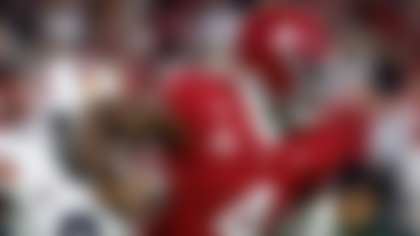DENVER -- The clock plunged toward the one-minute mark, and Peyton Manning barked out orders to the right side of the offensive formation, checking Julius Thomas to a slant before snapping the ball and delivering a pass to his tight end for a 3-yard gain.
You could hear all that because the drizzle-drenched stadium was half-full by then. And save for those booing, anyone remaining was in a quiet state of shock.
No one pictured this being how it could end for No. 18.
Maybe this will be it. Maybe it won't. But based on postgame comments coming out of a raucous Colts locker room that was trying to maintain a healthy respect for Manning, it's abundantly clear that this isn't the monster who terrorized defenses in 2006 or '07, or even Week 6 or 7. No, this Manning, in a 24-13 defeat to his Indianapolis successor, Andrew Luck, looked like one who had to scuffle for each and every inch, including the 108 meaningless ones described above.
And just so you know, your eyes weren't deceiving you. A string of text messages from guys paid to evaluate football players confirmed what we could all vividly see in the Denver Broncos' season-ending loss: Manning's body can no longer cash the checks his mind is so incredibly capable of writing.
From an AFC executive: "Saw a lack of velocity, declining arm strength. No juice or zip on throws. Shelf life."
One NFC scout said: "It's sad watching him, even more sad how Denver treated one of the greatest. Arm looks shot, sad seeing him look like that, knowing how big a competitor he is."
An AFC scout: "Missed deep ball, routine throws were getting knocked down because he couldn't drive the ball, timing was off. Never looked like he could get in a routine. He couldn't dictate the game like normal because he just couldn't make the throws that needed to be made."
And an NFC exec: "Terrible overthrows and incompletions. He may be hurt."
And when asked if they thought this was it, the NFC exec said, "Just look at his last five weeks," while the AFC exec opined that the Broncos know it is: "My suspicions are we saw the spike in their rushing offense (over the second half of the season) to help him."
To their credit, the Colts knew all of this. On Friday, linebacker D'Qwell Jackson explained to me what the Indy defense wanted to do by pulling one play out of the film vault. It was Denver's first offensive snap against Cincinnati in Week 16. The Bengals brought linebacker pressure up the middle and hit Manning. He completed the pass -- a 21-yard gain to Emmanuel Sanders -- but it was a challenging throw into traffic. Eventually, the hits and tight throwing windows caught up to Manning. Denver lost.
"That's the blueprint," Jackson told me, two days before the Divisional Round bout. And the Colts followed it to a T. They got bodies to Manning. They deployed their corners in a manner that forced Manning to drive throws downfield and to the sideline. They tested him physically, rather than mentally.
Eventually, the dam broke, like the Colts figured it would.
"Make him uncomfortable in the pocket," said defensive lineman Arthur Jones. "He's not the best in cold weather. It was anything -- get a hand up, punch the pocket, get guys in the face. We were watching him on the sideline bitch and complain to his offensive line. Any time you see that as a defensive player, you're like a shark -- there's blood in the water."
It's not like the idea of hitting a quarterback to beat him is a new one. But Manning's complete inability to counteract this approach was striking. Between scattershot downfield strikes and intermediate throws lacking NFL velocity, it quickly became clear to everyone in the building -- and most of all, the Colts -- that this wasn't the same guy.
"When we kept seeing him throwing it 5 yards, 6 yards over his receivers, we were like, 'We got it right here,' " said veteran D-lineman Ricky Jean Francois. "You've never known Peyton to overthrow guys. You've known him to put it right on the numbers. And when he kept overthrowing it? That was blood in the water. We had to get after him."
These signs started to surface at the end of the first half and became undeniable in the minutes right after the break. And when they did, Jones said, "It was exciting. We were excited. At a loss for words."
On the subject of his future, Manning's message has softened considerably. Manning said on Christmas Eve that he planned to return "if the Broncos will have me." CBS' Jim Nantz revealed in the fourth quarter of Sunday's game that Manning told the network's crew during a Saturday production meeting he'd "wait and see" on 2015. After the game, asked if he would return next fall, Manning responded, "I can't say that."
It's important to remember here that few greats have been afforded the exit enjoyed by Manning's boss, John Elway, who went out with back-to-back Super Bowl titles. Dan Marino lost his final game 62-7. Joe Montana's career ended in a New Year's Eve wild-card loss to Miami that no one remembers. Troy Aikman was actually waived by the Cowboys before retiring a month later. Like Aikman, Steve Young was forced from the game by concussions: He was knocked out of a Week 3 game in 1999 after a shot to the head and never played again.
Manning, actually, already cheated that kind of abrupt exit once. That he got to another Super Bowl, won another MVP and set more passing records after four neck surgeries is a tribute to how strong his passion for the game is and how deep his determination goes. He'll take his time and think this through, and it wouldn't be a shock if he gave it one more go. But for all players, the tank eventually hits empty, and that might be where we are now with Manning.
Ninety minutes after the final gun Sunday, Manning was walking through the bowels of the stadium with a Broncos staffer, his mom and dad trailing behind. And as he climbed into his BMW, Archie opened the door for Olivia and the family drove up the ramp and into the night, it was impossible not to wonder if there was a finality to the moment.
Follow Albert Breer on Twitter @AlbertBreer.











